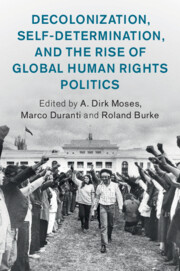Book contents
- Decolonization, Self-Determination, and the Rise of Global Human Rights Politics
- Human Rights in History
- Decolonization, Self-Determination, and the Rise of Global Human Rights Politics
- Copyright page
- Contents
- Notes on Contributors
- Acknowledgments
- Introduction
- Part I Anti-Colonial Struggles and the Right to Self-Determination
- 1 Seeking the Political Kingdom
- 2 Decolonizing the United Nations
- 3 The Limits of Humanitarianism: Decolonization, the French Red Cross, and the Algerian War
- 4 Connecting Indigenous Rights to Human Rights in the Anglo Settler States
- 5 Privileging the Cold War over Decolonization
- Part II Postcolonial Statehood and Global Human Rights Norms
- Part III Colonial and Neocolonial Responses
- Index
4 - Connecting Indigenous Rights to Human Rights in the Anglo Settler States
Another 1970s Story
from Part I - Anti-Colonial Struggles and the Right to Self-Determination
Published online by Cambridge University Press: 24 June 2020
- Decolonization, Self-Determination, and the Rise of Global Human Rights Politics
- Human Rights in History
- Decolonization, Self-Determination, and the Rise of Global Human Rights Politics
- Copyright page
- Contents
- Notes on Contributors
- Acknowledgments
- Introduction
- Part I Anti-Colonial Struggles and the Right to Self-Determination
- 1 Seeking the Political Kingdom
- 2 Decolonizing the United Nations
- 3 The Limits of Humanitarianism: Decolonization, the French Red Cross, and the Algerian War
- 4 Connecting Indigenous Rights to Human Rights in the Anglo Settler States
- 5 Privileging the Cold War over Decolonization
- Part II Postcolonial Statehood and Global Human Rights Norms
- Part III Colonial and Neocolonial Responses
- Index
Summary
Taking a transnational and comparative approach, this chapter examines how a distinctive discourse of indigenous rights in Anglo settler states (the United States, Canada, Australia, and New Zealand) threaded claims at the level of the state – about collective identity, treaty promises, land rights, and sovereign peoplehood – together with an international language of human rights. Indigenous claims to rights of identity and sovereignty were not considered human rights in the way that international institutions and civil society was employing the concept in the 1970s. That is, to protect individuals from violence and suffering at the hands of the state. Yet indigenous peoples in the Anglo settler states argued that their claims to collective rights were matters of concern to humanity. This chapter argues for an alternative genealogy of the 1970s – distinct from the earlier anti-colonial claims of leaders in the Third World and from the increasingly individualist emphases in other human rights campaigns – in which indigenous peoples in the heart of “the West” claimed collective, quasi-sovereign, and substate rights in part by deploying, and expanding, the language of human rights.
- Type
- Chapter
- Information
- Publisher: Cambridge University PressPrint publication year: 2020



